Alex Vatanka is the director of the Iran Program and a senior fellow at the Middle East Institute.
Under President Ebrahim Raisi, the Islamic Revolutionary Guard Corps (IRGC) is poised to exert greater control over Iran’s national security agenda and economy. Several of his ministers and advisors were members of the IRGC or have connections to it.
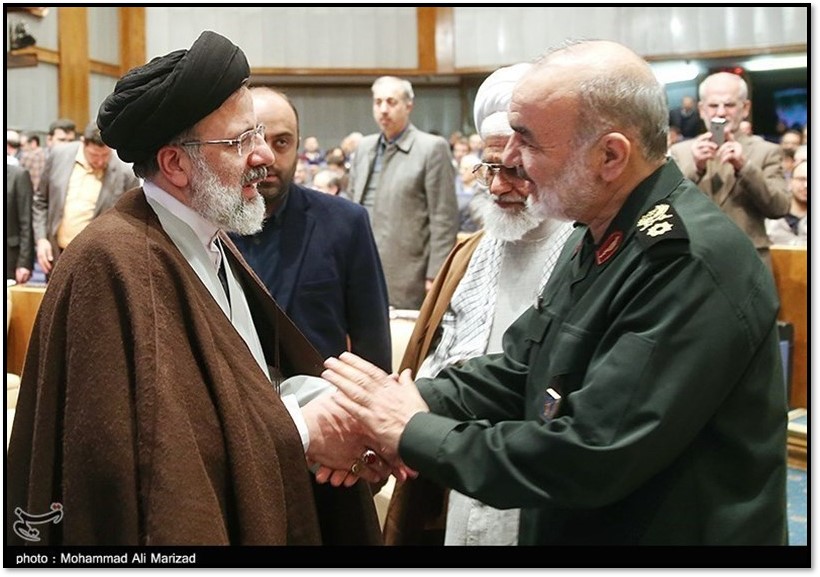
Founded in 1979, the IRGC is tasked with protecting the Islamic system of government from foreign and domestic enemies. It first quelled domestic uprisings and then defended the nation against Iraq’s invasion in 1980. The IRGC’s elite Qods Force is responsible for operations abroad, including managing relationships with proxy militias. The IRGC reportedly has greater access to budgetary resources than the Artesh, the conventional military.
The IRGC has also become one of the most important players in Iran’s economy. After the 1980-1988 war with Iraq, the IRGC got involved in reconstruction and won lucrative government contracts, often with no competition. Its expansion into new sectors of the economy accelerated under President Mahmoud Ahmadinejad (2005-2013), a former member of the IRGC.
Raisi lauded the IRGC’s involvement in non-military matters before becoming president. “The IRGC has excelled in every field it has entered, including security, defense, services and construction, both internationally and domestically,” he said in March 2021, when he was chief of the national judiciary. The IRGC and its affiliated companies stand to gain from new contracts from Raisi’s government.
Raisi’s appointments signaled a shift from his predecessor, Hassan Rouhani, who wanted to keep the IRGC out of the political realm. Rouhani also tried to curtail the IRGC’s outsized role in the economy. A leaked interview with Rouhani’s foreign minister, Mohammad Javad Zarif, revealed the depth of the power struggle between the IRGC and Rouhani’s government.
Unlike the seven previous presidents, Raisi did not lead a political faction. He has spent almost his entire career in the judicial branch, so he does not have his own constituency within the regime. His inner circle has largely consisted of individuals connected to the Office of the Supreme Leader or the IRGC. He may rely on his connections to the IRGC to achieve his policy priorities or align his agenda with the IRGC.
Raisi’s Appointments
Some of Raisi’s appointments reflected a preference for the IRGC old boys’ network over technocrats with proven competence. Raisi’s 19 cabinet nominees did not include any women or religious minorities. But four were IRGC members:
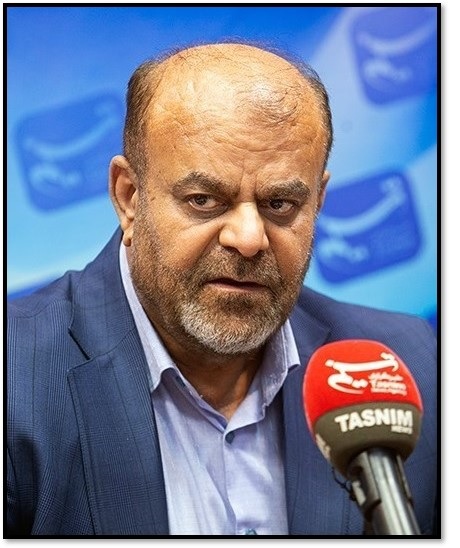
- Hojatoleslam Seyed Esmail Khatib (Minister of Intelligence)
- Rostam Qassemi (Minister of Roads and Urban Development)
- Ahmad Vahidi (Minister of Interior)
- Ezzatollah Zarghami (Minister of Tourism and Cultural Heritage)
Qassemi was a particularly controversial selection. He was the IRGC Qods Force’s deputy commander for economic affairs before he was confirmed by Parliament. Qassemi was sanctioned by the U.S. Treasury in 2019 for overseeing a large oil smuggling network. He previously served as oil minister under Mahmoud Ahmadinejad from 2011 to 2013. During his tenure, the ministry reportedly awarded oil and gas contracts to companies with ties to the IRGC. But sometimes the companies were unable to implement the financial and technological aspects of large projects.
Raisi’s pick for vice president of economic affairs, Mohsen Rezaei, has little experience with economic planning. He has a doctorate in economics but is better known as the longest-serving IRGC commander. During his tenure from 1981 to 1997, the IRGC took on construction projects and became increasingly involved in the economy.
Raisi’s Military Team
Raisi has no background in military affairs, so he may look to the commanders serving under him for guidance. The four most influential military leaders hail from the IRGC and share the same priorities:
- Arming, training and funding proxy militias across the Middle East, the “Axis of Resistance”
- Pushing for the withdrawal of U.S. forces from the region
- Increasing Iran’s deterrent power through its missile program
- Opposing Israel
- Deepening military relationships with China, Russia and other countries that challenge the U.S. presence in the region
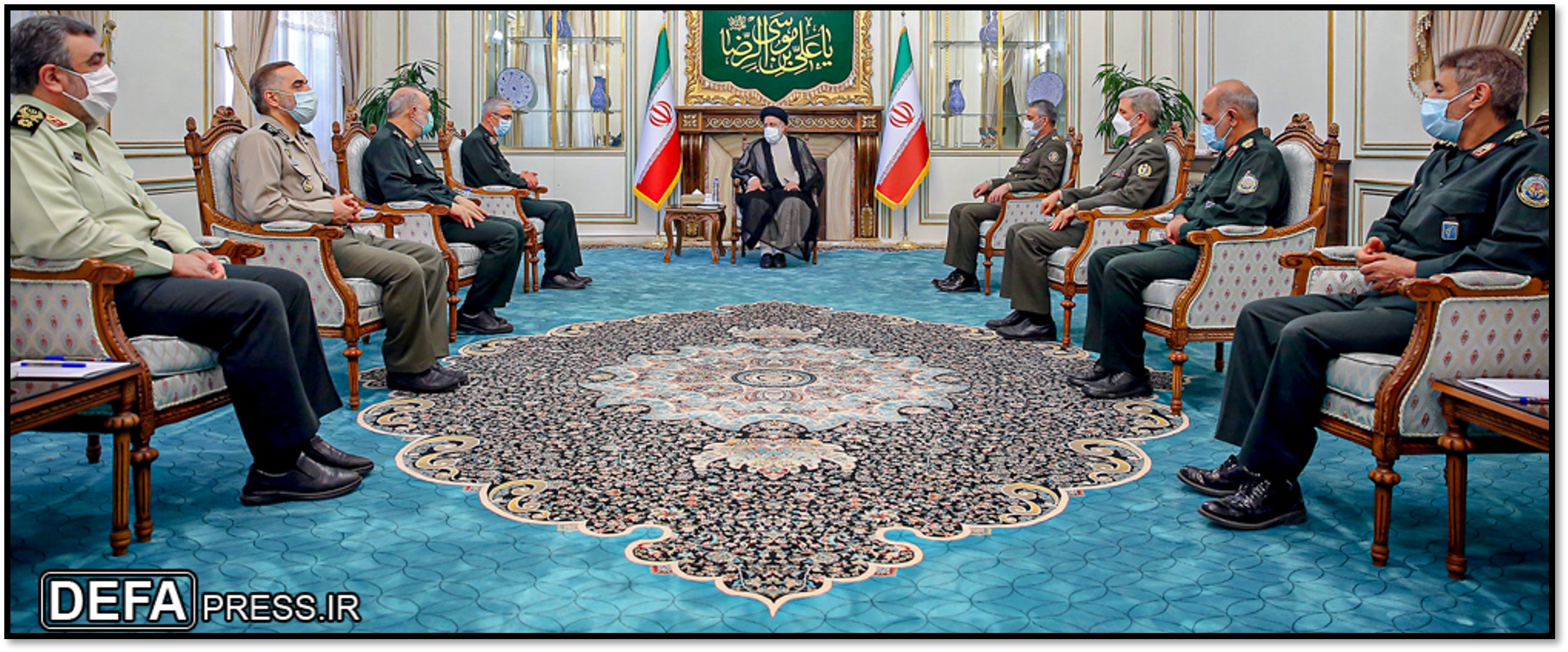
The following are profiles of four key military leaders, all associated with the IRGC.
Amir Ali Hajizadeh
Brigadier General Amir Ali Hajizadeh is the commander of the IRGC Aerospace Force. He has long been a vocal supporter of Iran’s ballistic missile program and asymmetric military doctrine, including support for proxy militias. In 2019, he and seven other IRGC commanders were sanctioned by the U.S. Treasury under Executive Order 13224 for overseeing Iran’s “provocative ballistic missile program, harassment and sabotage of commercial vessels in international waters, and its destabilizing presence in Syria.”
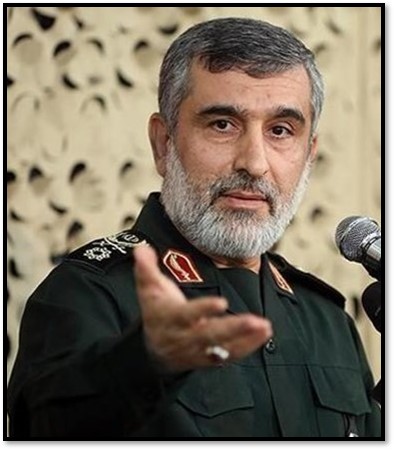
Born in 1962 in Tehran, Hajizadeh reportedly served as a sniper with the IRGC during the 1980-1988 war with Iraq. He participated in major offensives, including Operation Dawn 8 in 1986, Operation Karbala 4 in 1986, and Operation Karbala 5 in 1987. In the 1980s, he developed a close relationship with General Hassan Tehrani Moghaddam, known as the father of Iran’s ballistic missile program.
From 2006 to 2009, Hajizadeh served as commander of the IRGC Air Force. In 2009, the IRGC Air Force was reorganized into the new IRGC Aerospace Force. Supreme Leader Ayatollah Ali Khamenei appointed Hajizadeh as commander of the branch, which operates ballistic missiles, drones, fighter jets, helicopters, and air defense systems. It also oversees the IRGC’s space program.
Under Hajizadeh’s command, the Aerospace Force attacked U.S. targets. In June 2019, Iran downed a Global Hawk drone that it claimed had entered Iranian airspace. In January 2020, Iran launched 15 to 22 short-range ballistic missiles at Ayn al Asad and Erbil Air Bases in Iraq, which also housed U.S. soldiers. No fatalities were reported, but more than 100 U.S. service members were diagnosed with traumatic brain injuries. The attack was in retaliation for the killing of Iranian General Qassem Soleimani, the head of the IRGC’s elite Qods Force, by a U.S. drone. In August 2021, Israeli Defense Minister Benny Gantz blamed Hajizadeh for “dozens of terror attacks in the region employing UAVs (unmanned aerial vehicles) and missiles,” including strikes on ships linked to Israel.
In January 2020, Hajizadeh faced widespread public criticism after the IRGC mistakenly shot down a Ukrainian airliner. All 176 people on board were killed, including 82 Iranians. Hajizadeh accepted responsibility but was not punished, which indicated his central place in the IRGC hierarchy and support from the Supreme Leader. The following are quotes from Hajizadeh on key issues.
On the United States and Israel:
- “Enemies are trying every day to take control of the region and gain access to the resources of the countries. Today, the Americans are based in Syria and seek to disintegrate Iraq, Syria and Iran. But they have not succeeded thanks to the Leader’s [Ayatollah Khamenei]) guidance, and the important thing is the vigilance and insight of the people of the region and Iran.” (July 4, 2021)
- “We must unite our efforts to remove the U.S. troops from the region and destroy the Zionist entity [Israel].” (Feb. 14, 2020)
- “America has never been our friend and never will be. Therefore, our relations with America will never be normalized, and even normalization [of relations with the United States] will not resolve the problems of the country [Iran].” (July 3, 2021)
- “These [35 U.S. bases] are all in range of our missiles, and the occupied lands [Israel] are also good targets for us. We have thought of measures to set up bases and deploy missiles to destroy all these bases in the early minutes after an attack.” (Jan. 4, 2012)
On Iran’s missile program:
- “Missile power is not negotiable. This deterrence power has been created for the country, and we do not hold talks about it with anyone at all.” (Feb. 19, 2019)
- “No one has forced us to restrict ourselves to the range of 2,000 km (1,240 miles) because we do not talk to anyone about our missile power. It was our decision, and this range [restriction] is not permanent for us.” (Jan. 2, 2021)
On Ebrahim Raisi’s election:
- “The people [of Iran] have hope that with the election of the first [true] Islamic government [of Ebrahim Raisi] -- and capitalizing on the presence of [supporters of Khamenei’s vision] -- the people’s problems will lessen.” (July 3, 2021)
Esmail Ghaani
Brigadier General Esmail Ghaani is the commander of the Qods Force, the external operations branch of the IRGC. He has kept a relatively low profile throughout his career and has a reputation for being more of a bureaucrat than an idealogue or military strategist. In 2012, he was sanctioned by the U.S. Treasury for his role in sending funds and weapons to Iranian proxies and allies, such as Hezbollah, the powerful Lebanese militia and political movement.
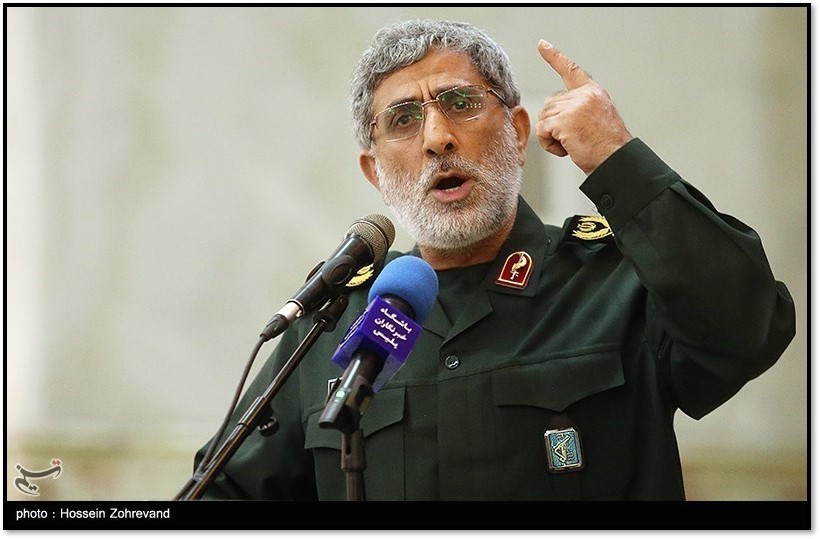
Born in 1959 in the northeast city of Mashhad, Ghaani joined the IRGC in 1980 and received 35 days of training at Imam Ali Officers' Academy in Tehran at the start of his military career. He was first deployed to Kurdistan province to put down an uprising. After Iraq invaded Iran in 1980, he was made a division commander and sent to the frontlines. He led the 5th Nasr Brigade and 21st Imam Reza Armored Brigade. During the eight-year war, he befriended Qassem Soleimani and Ali Khamenei, who was president at the time.
After the war, Ghaani joined the Qods Force when it was established in 1988. He focused on countries east of Iran, including Afghanistan and Pakistan. Ghaani also oversaw logistics and coordination among different parts of the IRGC.
In 1998, he was appointed as the deputy commander of the Qods Force under Soleimani. Ghaani oversaw financial disbursements and weapons transfers to Iranian proxies. He also played a role in Iran’s intervention in the Syrian civil war, which broke out in 2011. In 2013, Ghaani and the IRGC began recruiting Afghan Shiites to fight in the new Fatemiyoun militia on behalf of the Assad regime. Ghaani was appointed to head the Qods Force after Soleimani was killed in January 2020.
On the United States:
- “I warn the U.S. president, CIA director, secretary of defense, secretary of state and other American officials involved in the assassination of martyr Soleimani that they must learn the clandestine lifestyle of Salman Rushdie because the Islamic Republic will avenge the blood of martyr Soleimani which was shed unrightfully.” (Dec. 30, 2020)
- “American mischief will not deter the Qods force from carrying on its resistance path.” (Jan. 2, 2021)
On Iran’s intervention in Syria:
- “Thanks to Iran's presence in Syria—physically and non-physically—big massacres were prevented...if the Islamic Republic had not been present in Syria, the massacre of its people would have been multiplied.” (May 27, 2012)
On Israel and the Palestinians:
- “Palestine today is not alone but with it a Resistance Axis that is getting wider, stronger and more coherent. … Until the destruction of the usurper regime [Israel] and the liberation of the whole land, we will not be at ease and we will not be at peace.” (May 21, 2021)
- “As someone who knows the Resistance, I must say that the era when the Zionist regime wanted to kill the Palestinians with weapons, bullets and guns has passed. Today, more than 3,000 rockets fired towards the occupied territories were produced by the Palestinians themselves.” (May 29, 2021)
Mohammad Bagheri
Major General Mohammad Bagheri is the chief of staff of the Armed Forces, which is technically the highest-ranking military position. Bagheri has spent most of his decades-long career in intelligence, so not many details about his early career have been publicized. He has also opted to keep a relatively low profile. Bagheri’s family is well-known for its military service. His older brother, Hassan, established the IRGC’s intelligence branch in 1980 and was a key strategist during the war with Iraq until he was killed in 1983. In 2019, he was sanctioned by the U.S Treasury for being an appointee of Supreme Leader Khamenei and implementing “his destabilizing policies.”
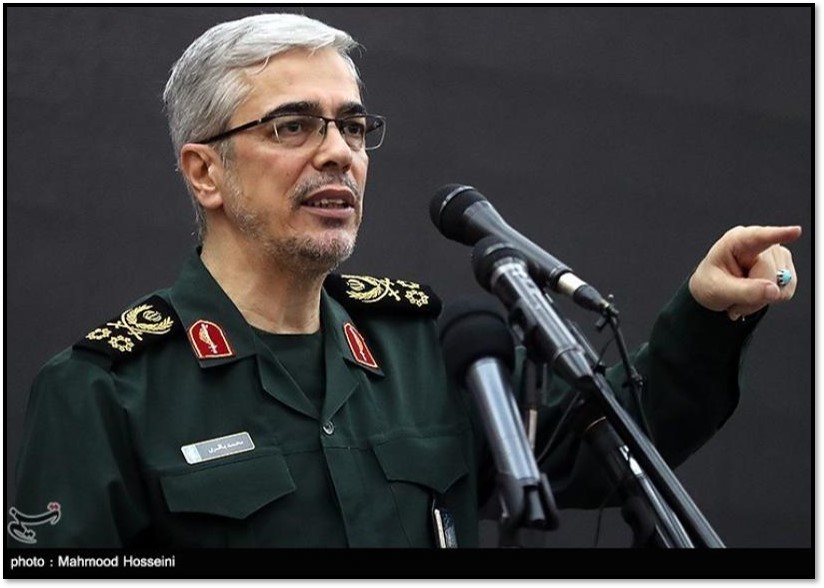
Born in 1960 in Tehran, Bagheri studied mechanical engineering before the Islamic revolution. In 1979, during his freshman year, he participated in the seizure of the U.S. Embassy. Bagheri joined the IRGC in the summer of 1980 and was appointed head of IRGC Ground Forces Intelligence in 1983. He then became acting deputy chairman of intelligence and operations in 1988 and eventually became the permanent deputy chairman.
In 1999, Bagheri and Ghaani were among the 24 IRGC commanders who sent a letter to President Mohammad Khatami warning him to stop his liberalizing agenda and to deal decisively with student protests. “How long do we have to be subjected to this trial run of democracy, which has turned into anarchy and puts the Islamic regime at risk?” they asked. In 2008, Bagheri attained the rank of major general. In 2016, Khamenei appointed him Chief of Staff of the Armed Forces, responsible for overseeing both the IRGC and the Artesh.
On the United States and sanctions:
- U.S. leaders are “disloyal, cruel, criminal, isolated, angry, corrupt, and on the Zionist regime’s [Israel’s] payroll.” (May 23, 2018)
- “The outcome of negotiations with America is known beforehand, and that is surrendering to the United States. But this is not consistent with the Islamic Republic’s strategy.” (Oct. 26, 2020)
- “Despite all problems and sanctions Iran has been facing, the country has become more resistant to such an extent that all of the needs of the armed forces are supplied locally.” (Feb. 7, 2018)
On Iran’s regional policy:
- “We live in a part of the world where we would be defeated if we are not powerful.” (Oct. 26, 2020)
- “The Iraqi government seeks to implement the approval regarding the expulsion of the United States’ forces, and the resistance front will follow the issue and realize it.” (April 20, 2020)
- “Enemies do not have the courage to attack Iran militarily and they have resorted to espionage and cultural measures more. Of course, we do not have any greedy eyes on other countries’ interests and soil, but it is possible that we adopt an offensive approach to protect our interests to make foreigners keep thoughts of aggression against our country’s interests away even from their minds by witnessing impacts [of Iran’s actions].” (Feb. 19, 2019)
On Israel:
- “Israelis think they can keep hitting Syria and making mischievous moves elsewhere and in the seas and not receive any response. … The moves made in the past few days and future moves against their interests will bring them to their senses.” (April 25, 2021)
Ali Shamkhani
Rear Admiral Ali Shamkhani is the secretary of the Supreme National Security Council (SNSC), the highest body for defense and security policymaking. He is the first ethnic Arab to hold the influential position. Shamkhani has a close relationship with Khamenei dating back to the 1980s. A longtime regime insider, he has straddled the divide between reformist and hardline camps. In 2020, Shamkhani was sanctioned along with seven other senior officials by the U.S. Treasury for involvement in ballistic missile strikes on Iraqi bases housing U.S. forces and for advancing Iran’s “destabilizing objectives.”
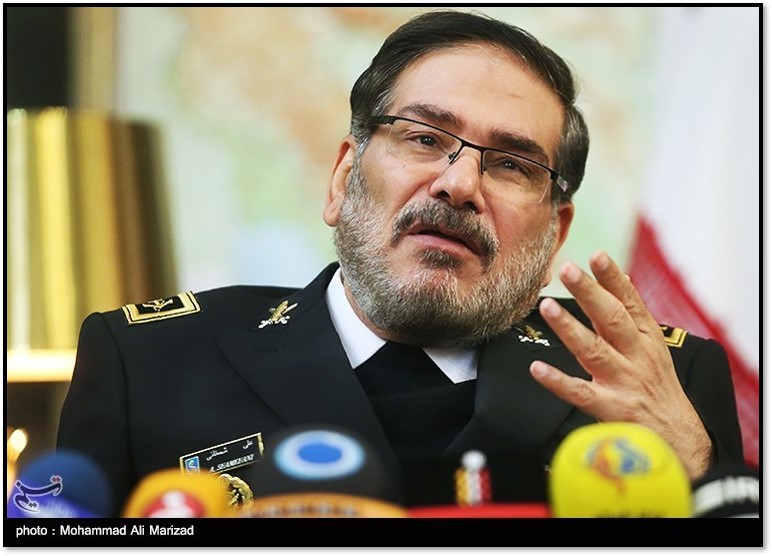
Born in 1955 in Ahvaz, Shamkhani visited Los Angeles with his father and two brothers after finishing high school in the mid-1970s. His brothers chose to stay to study, but Shamkhani opted to return to Iran. “I didn’t approve of the culture,” he recounted in an interview years later. He studied engineering at Ahvaz University. While a student, Shamkhani participated in an underground organization that opposed the monarchy.
Shamkhani joined the IRGC shortly after the 1979 revolution and became the first commander in his native Khuzestan province, near the Iraqi border. During the war with Iraq, he became the deputy commander of the IRGC and simultaneously commanded its ground forces.
Shamkhani briefly served as IRGC minister from 1988 to 1989 until the position was eliminated as part of restructuring in the Ministry of Defense. In 1989, Khamenei promoted Shamkhani to the rank of admiral and appointed him as commander of the Artesh Navy. Shamkhani was also appointed commander of the Artesh Navy and shortly after, commander of the IRGC Navy as well. He held both posts until President Khatami, a reformist, named him defense minister in 1997.
In 1999, Shamkhani became the first Iranian defense minister to visit regional rival Saudi Arabia since the 1979 revolution. He later received Saudi Arabia’s highest medal, the Order of Abdulaziz al Saud, from King Fahd for his role in improving relations between Iran and its Arab neighbors.
In 2001, Shamkhani made a usual move by running for president against incumbent President Khatami, who had appointed him defense minister. Khatami won with 77 percent of the vote. Shamkhani took third place with just 2.62 percent of the vote. He nevertheless continued to serve as defense minister during Khatami’s second term, which ended in 2005. From 2005 to 2013, Shamkhani headed the Iran Armed Forces’ Center for Strategic Studies.
In 2013, President Hassan Rouhani, a centrist, appointed Shamkhani as secretary of the SNSC. Shamkhani simultaneously served as the Supreme Leader’s representative on the council, another indicator of Khamenei’s trust. President Raisi, who took office in August in 2021, has not indicated whether he will replace Shamkhani.
On the United States:
- “The continued dangerous and malicious presence of U.S. troops and their overt and covert interference in the internal affairs of countries in the region will further increase tensions in the region.” (Aug. 11, 2021)
- “The U.S.’ policy is based upon creation of chaos and insecurity, no matter where it is pursued, in Afghanistan or in Iraq.” (Oct. 19, 2020)
- “Concerning the Middle East issues, we neither have any intention to negotiate with the U.S. nor do we have any inclination or see any need to do so.” (April 22, 2017)
On Iran’s missile program:
- “We decide about range, precision, speed and destruction power of our missiles based on our interests and threats and this process is not negotiable.” (March 3, 2019)
- “Iran has no scientific limitation to extend the range of its military missiles. Iran simply does not have the will to extend the range of missiles based on its defense doctrine; however, it constantly works to increase (their) precision.” (Jan. 29, 2019)
On the 2015 nuclear deal:
- “The only way out of the stalemate created by the United States is to guarantee the Iranian people's rights. To revive the JCPOA (Joint Comprehensive Plan of Action), the United States must abandon its excessive demands." (Aug. 22, 2021)
On nuclear weapons:
- “We won't breach our undertakings with the Nonproliferation Treaty or the Comprehensive Test Ban Treaty…. We won't make use of this natural right to build a nuclear weapon.” (November 1998)
On Iran’s national security goals:
- “Our defensive strategy is one of deterrence. We have never started a war against anyone. And we wouldn't do so in the future. But it is also our natural right to prevent anyone from encroaching on our security. We have sustained great losses from our war with Iraq, and we could not neglect this experience.” (November 1998)
On Israel:
- “The volume of fire, the range of missiles and the tactical capability of Hamas and the Islamic Jihad that succeeded to pass through various radar systems and the Iron Dome have invalidated the idea of the invincibility of the Zionist regime…. The collapse of this fake regime can be seen in the not-too-distant future.” (Aug. 8, 2021)
